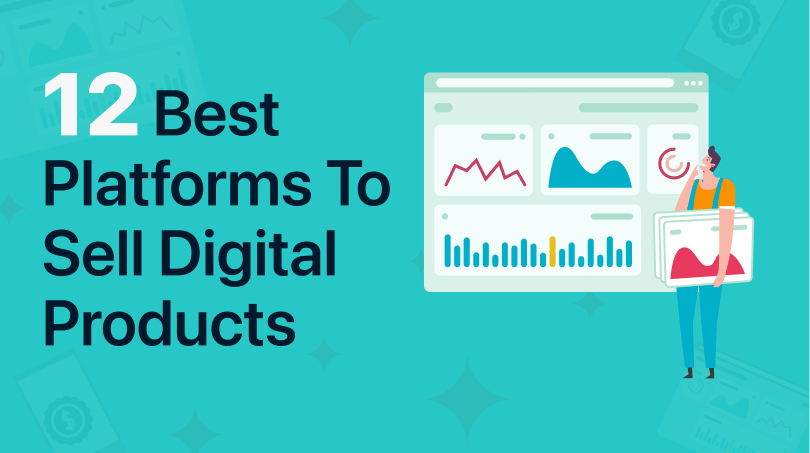Consumers spend more than $54 billion each year on digital goods and downloadable products, and that number is growing every year, making it a great opportunity for content creators to bring in recurring income. To do so, they need high-quality digital products, and a platform for sharing their products with potential consumers.
In this article, we’ll cover the best eCommerce platforms and apps to sell digital products for your online business.
Table of Contents
Toggle1. Selling on Your Own Website
The number one solution for selling digital products will always be your own website. Regardless of the types of digital products you sell in your online store, there are several significant benefits to selling on your own site, including
- Not sharing a percentage of the sale, commissions, or fees from another selling platform
- Having a better chance at upsells during checkout
- Capturing user information directly, which you can use for remarketing
- Ability to directly manage search engine optimization (SEO) efforts to increase traffic to your site/landing page
But perhaps the largest advantage of selling on your site is that your products won’t be featured next to your competitors. When you use a platform like Amazon or other marketplaces, you’re in direct competition with everybody else selling similar products, sometimes at a lower price.
One strategy you should employ is using a sales funnel optimizer like ThriveCart to optimize your conversion rates and increase your sales revenue.
Best Platforms to Sell Online Courses
When searching for the best platform to sell online courses, you want to make sure you also get the marketing tools you need to get your courses in front of the right target audience. You also need to have an optimized sales funnel and seamless checkout process to drive conversions.
Here are the best platforms to sell online courses, webinars, podcasts, and tutorials.
2. ThriveCart Learn
With ThriveCart Learn, you can create and sell online courses from within the platform without having to worry about third-party integrations… although you can integrate with a large number of third parties if you choose to do so. ThriveCart Learn is included for free with a standard ThriveCart plan, providing a robust platform for building and selling online courses, along with added features such as high-converting marketing funnels, embeddable landing pages, and affiliate campaign tools.
You also get unlimited courses, modules, and students— a huge win for an online course creator.
What users like most about ThriveCart is that it has high-converting checkout pages that are built to drive conversions and tools to manage and build a dynamic sales funnel.
Pros:
- Unlimited courses, modules, and students, included free with one-time ThriveCart payment
- Included high-converting checkout funnel process
- Supports one-click upsells and bump offers
- Flexible payment models, including subscriptions, plans, and trials
- Integrates with all major payment gateways
Cons:
- You can embed videos in your course content, but they must be hosted on another website, such as YouTube or Vimeo
Pricing:
ThriveCart offers a one-time payment model of $495 for the standard plan, which provides lifetime access to the platform with no recurring monthly fees. Included in that price is ThriveCart Learn, the online course platform. You may upgrade to Learn+, which unlocks additional advanced features to create course bundles and access advanced automation tools.
3. Teachable
Like ThriveCart, Teachable allows you to host online courses and includes built-in payment processing and affiliate marketing tools. Although the platform presents itself as a no-code solution, to offer webinars or live video, you’ll need coding knowledge to extend the codebase.
Teachable also allows course creators to attach supplemental material, create quizzes, and accommodate both synchronous and asynchronous learning.
Pros:
- Students can earn course completion certificates
- Enables monthly payment options for higher-priced courses and monthly subscriptions for ongoing courses
Cons:
- To include webinars or live video, you should understand coding concepts.
- Limited course customization options
- Does not support sales funnels
- Does not include a course marketplace for greater exposure
Pricing:
Teachable offers a free plan that charges $1 +10% of sales in addition to payment processing fees for up to one course. The basic plan includes 5 courses and unlimited students, with pricing starting at $39 per month (billed annually) with 5% transaction fees.
4. Thinkific
Thinkific is another option for creating and selling courses online. Pre-built templates help creators build curriculums and course reviews incorporating video, text, presentations, worksheets, surveys, and assignments.
Thinkific features include discussion spaces, progress tracking, and completion certificates.
Pros:
- Scalable subscription plans
- Students can track their progress through their courses
Cons:
- Limited themes for displaying courses
- Limited A/B testing for increasing conversions
- Limited options for upsells
Pricing:
You can launch Thinkific with a free option for one course, including course quizzes and surveys. The are no per-transactions fees except for payment processing. The basic platform starts at $36 per month for unlimited courses and students.
5. Podia
Podia offers an online course and website builder tool. It’s easy for beginners to build their site and get up and running with no code required.
However, Podia does not offer easy-to-use templates. Course creators are only able to customize the look and feel of their offers with basic editing tools.
Pros:
- Offers options for drip campaigns throughout the course
- Offers community-building options to grow followers
Cons:
- No templates provided, and limited customization options
- Email marketing options don’t allow for automation workflows
- No built-in student grading options
Pricing:
Podia offers a $0 monthly plan with 8% per transaction fees + payment processor fees of 30 cents + 2.9% of transaction. Paid plans start at $33 per month with no transaction fees except payment processing.

Best Platforms to Sell Digital Downloads
Selling digital goods online, such as digital art, audiobooks, and other digital content also requires a robust platform that provides easy digital downloads and marketing tools to help you sell. Whether you are a beginner or seasoned small business, selling one-time downloads or subscriptions to a membership site, when you sell online, you need the right tools.
If you decide to sell digital downloads outside of your own website, pay particular attention to the functionalities of the partner platform you decide to use, such as payment options for customers and transaction fees. Continuing our list, here are a few of the most popular options for selling digital downloads outside of your own website.
6. Payhip
Payhip is an option for selling eBooks, software, videos, and other digital downloads. You can upload and host your digital goods on the platform and Payhip handles the distribution and sales.
With Payhip, you can create a storefront, but you can also choose to link your call to action, buy now buttons, your website, or social media posts to Payhip’s checkout. This makes it a good choice for beginner bloggers, niche sellers, or those with a small audience or user base.
Pros:
- Unlimited products
- No limits or caps on revenue
- All features available to all users
Cons:
- Cannot connect your custom domain to a Payhip store
- Lack of customization options for stores
Pricing:
Payhip offers a free option with a 5% transaction fee or paid options starting at $29 per month + a 2% transaction fee. The pro version is $99 a month with no transaction fees.
7. Gumroad
The Gumroad platform allows you to embed forms within your website and personalize landing pages within the platform. It is popular with some authors, musicians, and comedians that sell digital products directly to consumers.
While Gumroad makes digital product sales easier with plug-and-play tools for file hosting, product delivery, and payment processing on your website, it does take a 10% cut from every sale. For that cost, it may make more sense to simply use a solution that allows you to do all of these things right from your own website, without sending the processing efforts to a third party.
Pros:
- Can generate license keys for software
- Supports affiliate program options
Cons:
- Does not support upsells or bump offers
- Fewer payment gateways than some other platforms
Pricing:
Gumroad does not charge a monthly fee, but takes a flat 10% cut of every sale
8. Etsy
Etsy is known for selling physical goods, such as arts and crafts, but you can also sell digital downloads such as downloadable art, templates, and patterns on the platform. While it’s fairly easy to list products for sale, those with large catalogs will have to manually input information—a time-consuming process.
One of the big advantages of Etsy is that they have a huge number of site visitors and shoppers monthly. The downside, though, is that Etsy’s search feature will have your products appearing in search against innumerable competitors.
Pros:
- Supports instant downloads
- Supports made-to-order or custom options
Cons:
- Listing fees for each item that have to be renewed quarterly
- Transaction fees for each sale
- Customizing a storefront can be time-consuming
- Does not offer additional marketing tools outside of paid ad options
Pricing:
Etsy charges a listing fee of $0.20 for each item you put up for sale, and a 6.5% fee for each transaction. When using Etsy payments, there are also payment processing fees that vary depending on the payment method.

Best Platforms to Sell Physical Products
Some online creators and entrepreneurs may look to sell physical products alongside their digital counterparts. If that’s you, you’ll want to choose an all-in-one platform that lets you build customizable storefronts with a website builder and templates. You should also look for a platform that offers multiple payment methods and discount codes or special offers.
You may be aware of many of the big-name platforms already, such as Amazon and Shopify, but here are the best platforms to sell physical goods that you should definitely consider.
9. Sellfy
Sellfy is an eCommerce platform with a clean, professional storefront and is a fast way to get started selling online. The platform claims you can set up an online store in just five minutes, but most users will want to customize the look to make their store stand out.
Sellfy provides users with email marketing tools and automated cart abandonment sequences. However, it does not allow for subscription services, has limited customer payment options, and caps your revenue potential.
Pros:
- Customizable storefront
- Built-in email marketing campaigns
Cons:
- Plans cap revenue at a certain amount, with overages subject to 2% fee
- Does not offer subscription services
- Credit cards only accepted through Stripe
Pricing:
Starts at $19 per month (one payment of $456, billed every two years) for up to $10,000 in sales.
10. Squarespace
Squarespace is in the business of building websites, including eCommerce stores. It features a website builder tool for entrepreneurs and small business owners to create their own storefronts using drag-and-drop tools and pre-built templates.
Squarespace is a good choice as a starter site for online sellers.
Pros:
- Can manage multiple sites
- Provides email marketing and social media marketing tools
- Integrates with ShipStation for shipping
Cons:
- Lack of multicurrency options for international sales
- Templates can be difficult to fully customize
- Limited checkout integrations
Pricing:
eCommerce storefront plans start at $23 per month + 3% for each transaction
11. BigCommerce
BigCommerce is another all-in-one eCommerce solution for selling physical and digital goods online. While typically thought of as a solution for enterprise-level companies and large-scale sellers, many small businesses also choose BigCommerce because of the features that are included in the pricing. Some other platforms charge extra for apps, plugins, or WordPress plugins for different product ideas.
Pros:
- No per-transaction fees
- Scalable for extensive inventory and products
Cons:
- Does not include email marketing tools
- Does not support subscriptions
- No multilingual options
Pricing:
Starts at $29 per month (billed annually) for up to $50,000 in sales per year.
12. Shopify
Shopify can also be a good, flexible choice for selling physical goods. Start up is simple and does not require technical skills since they offer pre-built templates. Shopify enables selling across every market and channel from a single platform. This allows you to centralize your sales and customer data across channels. You can also offer loyalty programs to encourage repeat customers.
If you plan to use paid ads to drive visitors, you can also export audiences to major ad platforms, such as Facebook or Instagram, and track attribution when ads lead to sales.
Pros:
- Built-in app store with more than 1,200 apps and plug-ins
- Wide variety of storefront themes
Cons:
- Does not offer marketing automation tools without additional fees
- Many apps have additional fees for use
Pricing:
Starts at $39 per month + credit card fees
How to Boost Digital Product Sales
Choosing the best platform for your type of digital products from online courses and digital goods will play a significant role in your success. While the best strategy is to generate traffic and sales on your own website as a selling platform, some online sellers also wish to open a store within an online marketplace to generate additional revenue.
No matter which platform you choose, you will want to make sure it has an intuitive management system and allows you to customize your online storefront and landing pages. It should have a seamless shopping cart and checkout engine that allows for upsells, discounts and coupon codes; multiple forms of payment including credit cards, and PayPal; and quick pay options such as Apple Pay or Google Pay.
ThriveCart is an ideal solution in most cases. You can host all of your online courses with ThriveCart Learn and ThriveCart Learn+ and optimize sales funnels on your own website.
ThriveCart features the highest-converting cart for online businesses, allowing you to leverage high-converting sales funnels, affiliate marketing campaigns, and landing pages. Whether you are selling digital products or physical goods, ThriveCart can help optimize your online sales and generate more revenue.
Get in touch with ThriveCart today to supercharge your sales.



 Our development team have been ...
Our development team have been ... 











 All Rights Reserved
All Rights Reserved